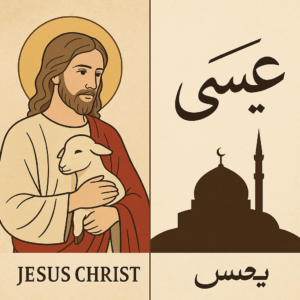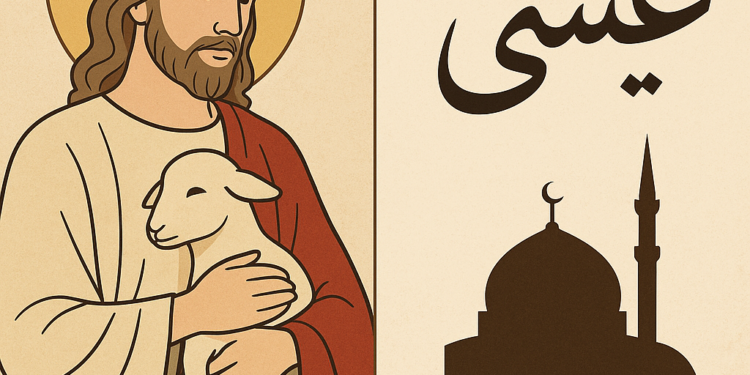
By Ibrahim Kegbegbe
In a country like Nigeria, where Christianity and Islam shape the lives, cultures, and identities of millions, the figure of Jesus Christ stands as both a point of convergence and divergence. Revered in both religions, Jesus—known as Isa in Islam—is central to the doctrines of Christianity and occupies an extraordinary status in Islam. Yet, the understanding of his birth, death, and rise differs significantly between the two faiths.
A Virgin Birth, A Shared Belief
Both Muslims and Christians in Nigeria and across the world hold a deeply rooted belief in the miraculous birth of Jesus. According to the Bible and the Qur’an, Jesus was born of a virgin—Mary in Christianity and Maryam in Islam. In Christianity, this event marks the divine incarnation of God in human form. The Gospel of Matthew recounts that Jesus was conceived by the Holy Spirit and born to fulfill the prophecy of a savior.
In contrast, Islam upholds that Jesus was born miraculously by the will of Allah, without a father, but emphasizes that he was a prophet and messenger—not divine. The Qur’an states in Surah Maryam (Chapter 19) that Maryam gave birth to Jesus as a sign to humanity, yet he remains a servant of Allah, not the Son of God.
Dr. Yusuf Ibrahim, an Islamic scholar at the University of Ilorin, explains, “In Islam, the virgin birth of Jesus is a sign of God’s power, much like the creation of Adam without parents. It confirms his prophethood but not divinity.”
The Crucifixion: Belief or Illusion?
The most profound difference between Christianity and Islam lies in the understanding of Jesus’ death. Christians globally commemorate Good Friday as the day Jesus was crucified at Golgotha, believing that his sacrificial death redeemed humanity from sin. His resurrection on Easter Sunday is considered the cornerstone of Christian faith, symbolizing victory over death and the promise of eternal life.
However, Muslims reject the crucifixion narrative. The Qur’an, in Surah An-Nisa (4:157), asserts that Jesus was neither killed nor crucified, but that it was made to appear so. Islamic tradition holds that Jesus was taken up to Heaven by God, and another person—possibly Judas Iscariot—was made to resemble him and was crucified in his place.
Professor Grace Okonkwo, a theologian at the University of Nigeria, Nsukka, notes, “The death of Jesus is essential to Christian soteriology. Without it, there is no resurrection. That’s why the difference in Islamic teaching is so significant—it challenges the foundation of Christian salvation.”
Resurrection or Ascension: The Belief in His Return
Despite differences in the narrative of Jesus’ death, both religions agree that he was raised up to Heaven and that he will return at the end of time. For Christians, Jesus’ resurrection is a triumph over sin and a guarantee of the second coming. The Book of Acts states that he ascended into Heaven in the presence of his disciples and will return in like manner.
Islam similarly teaches that Jesus was taken up alive into Heaven and that he will return before the Day of Judgment to restore justice, defeat the false messiah (Al-Masih ad-Dajjal), and unite humanity under the true worship of God.
Sheikh Musa Ahmed of the National Mosque in Abuja shares, “We believe Jesus will return, not as a new prophet, but to reaffirm the message of monotheism and stand as a witness over mankind.”
Shared Reverence in a Divided World
In a multi-religious society like Nigeria, where both faiths often shape inter-community relations, understanding the theological similarities and differences surrounding Jesus can foster greater interfaith dialogue and tolerance. Jesus is one of the most mentioned prophets in the Qur’an, and Christians regard him as their Lord and Savior. That shared reverence offers a unique opportunity for unity in diversity.
As religious tensions sometimes flare in parts of the country, spiritual leaders have called on adherents to focus more on what unites them than what divides them.
“Our common respect for Jesus should inspire compassion, dialogue, and mutual respect,” says Reverend Samuel Adeyemi of Lagos. “We may not agree on every doctrinal detail, but we can agree on the need for peace and love in our communities.”
The birth, death, and rise of Jesus Christ may be understood differently in Christianity and Islam, yet his role as a significant spiritual figure remains undisputed. In today’s Nigeria—rich in faith, culture, and diversity—these beliefs can serve as bridges rather than barriers. In the spirit of understanding and tolerance, both Muslims and Christians can find common ground in the message of Jesus: a call to righteousness, mercy, and the hope of divine promise.

















